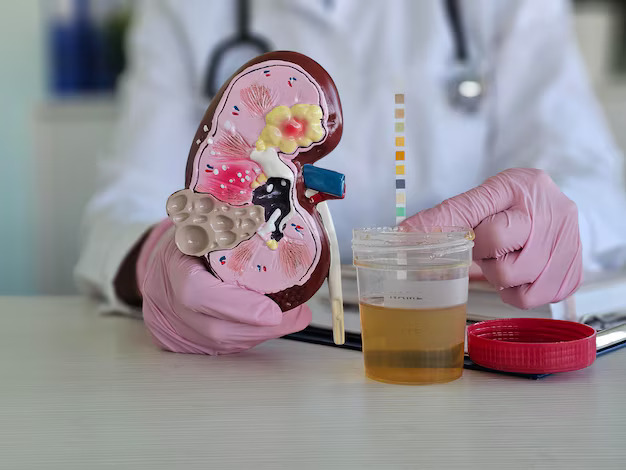Kidneys are two fist-sized bean-shaped organs, but their influence on the body is gigantic. The kidneys remove waste products, manage blood pressure, balance electrolytes, and assist in red blood cell production. And yet, kidney issues become synonymous with “silent diseases” because symptoms don’t manifest until the disease makes its entry. Since that is what happens when you have a kidney problem, prevention and awareness are key. By doing small but regular things each day, you can significantly decrease your chances of developing kidney problems. Here is a basic six-step guide to having healthy kidneys.
1. Drink water
Water is the kidneys’ best friend. Water in the body helps the kidneys to filter out toxins, balance fluids, and prevent stone formation. Most adults should aim for six to eight glasses of water daily, but your exact needs depend on activity level, climate, and overall health. A good indicator is the color of your urine—pale yellow usually means you’re drinking enough. While water is best, herbal teas and fresh fruit-infused water can also count. Try to restrict sugary beverages, energy drinks, and sodas because they put undue stress on the kidneys in the long run.
2. Balanced Diet
Dietary habits have a direct influence on kidney function. A balanced diet of whole cereals, fruits, vegetables, nuts, and lean proteins supports kidney function. High sodium, however, increases blood pressure and puts undue stress on the kidneys. Minor modifications such as home cooking, use of herbs in place of salt, and avoiding processed food can lower intake of sodium by a great extent. Foods that have high antioxidant capacity such as berries, green leafy vegetables, and bell peppers also nourish kidney tissue. If one already has risk for kidney disease, a physician or registered dietitian can recommend lowering the amount of protein or eliminating high-phosphorus foods to decrease kidney burden.
3. Control Blood Pressure and Blood Sugar
High blood pressure and diabetes, if not controlled, are two of the greatest dangers for the kidneys. Both, if not controlled, can over the long term damage the small blood vessels in the kidneys, destroying their ability to filter. Control, in other words, is a great means of protecting the kidneys’ health. Exercise daily, eat sensibly, manage stress, and—if recommended—take medication all contribute to keeping levels steady. Any lifestyle changes are helpful. For example, walking for 20 minutes a day or substituting sweet things with fruit can make a difference in the long term. By having a healthy heart and blood vessels, you are also protecting your kidneys.
4. Be Physically Active
Exercise not only keeps you in good health—it also affects your kidneys directly. Exercise provokes blood flow, keeps blood pressure in check, regulates weight, and keeps stress hormones at bay, all of which keep kidneys healthy. You don’t need to adhere to a rigorous gym program. Brisk walking, cycling, yoga, or swimming for moderate periods of time makes a difference. Shoot for at least 150 minutes of exercise each week, most days. Consistency is the key. These habits over time reduce risk for chronic diseases that put extra workload on the kidneys.
5. Limit Excessive Painkiller Use
Over-the-counter pain medications such as ibuprofen and naproxen work fine for occasional relief from pain, but frequent or chronic use can be harmful to the kidneys. At higher doses, these medications decrease blood flow to the kidneys so that the kidneys are less efficient at filtering out waste products. If you regularly use pain medications for headache, arthralgias, or back pain, you should consider alternative treatments with your physician. Acetaminophen, for instance, may be safer for sporadic use in certain situations, but consult an expert. The bottom line: do not self-medicate daily without being cognizant of the risks.
6. Have Regular Check-Ups
Since kidney disease creeps up, early detection is essential. A routine blood test (to monitor creatinine levels) or urine test (to screen for protein leakage) can detect subtle signs of kidney damage. If you have risk factors from high blood pressure, diabetes, obesity, or a family history of kidney disease, visits are especially crucial. Most folks do not receive information about kidney disease until symptoms such as fatigue, swelling, or urination change come on, and the disease may be well established by then. Screenings enable treatment and changes in lifestyle to start before that damage does.
Creating A Healthy Habit State of Mind
Protecting your kidneys isn’t about following strict or complicated rules. Instead, it’s about building small, sustainable habits that support your body as a whole. Drinking more water, eating a colorful diet, moving your body daily, and being mindful about medications are steps that pay off in long-term health. Regular check-ups with a renal specialist provide peace of mind and allow problems to be caught early.
Your kidneys work silently day after day to maintain your system in equilibrium. By doing these six steps, you are paying attention to them. Prevention is always better than the cure, and decisions you make today will safeguard your kidney health well into the future.



